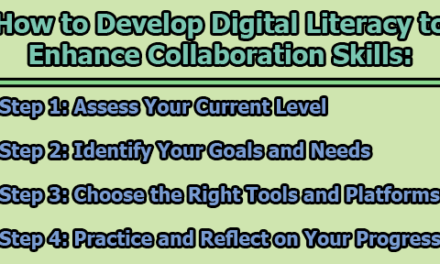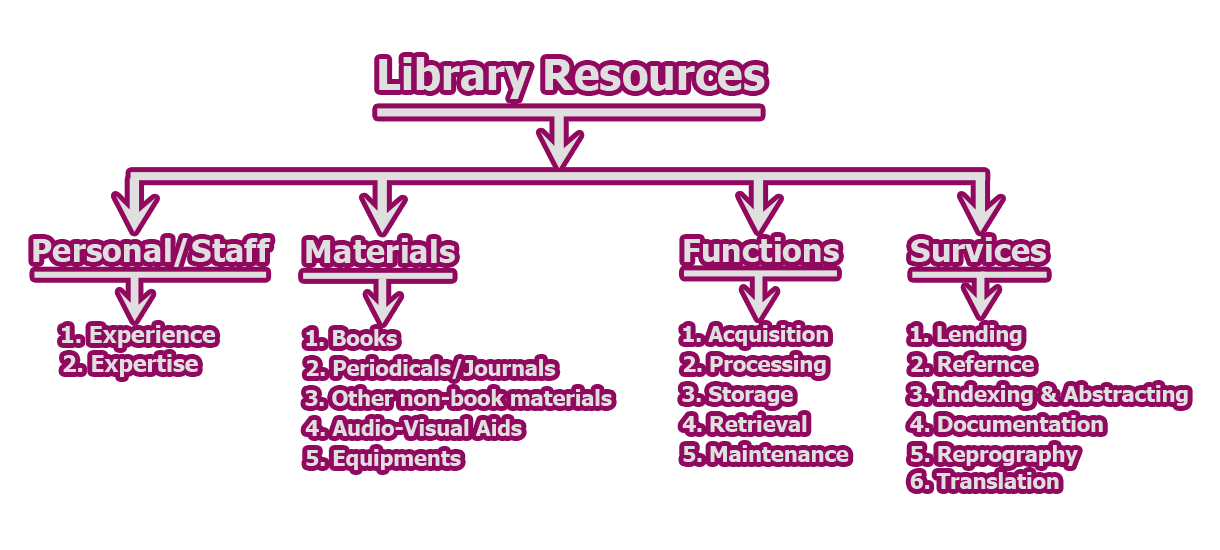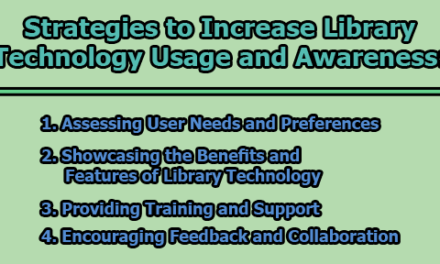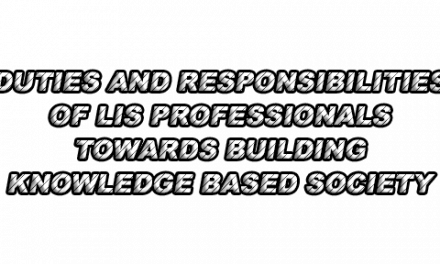The Role of Information Professionals in Promoting Information Literacy in Academic Libraries:
In today’s knowledge-driven society, the ability to effectively navigate, evaluate, and utilize information is paramount. This skill set, known as information literacy, is indispensable for students, researchers, and educators in academic settings. Academic libraries serve as the epicenter for cultivating information literacy skills, with information professionals at the forefront of this endeavor. In the rest of this article, we will explore the role of information professionals in promoting information literacy in academic libraries.
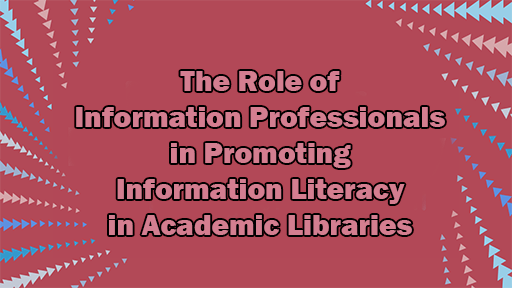
1. Foundation of Academic Success: Information literacy serves as the foundation of academic success, empowering individuals to engage critically with scholarly literature, conduct comprehensive research, and produce high-quality academic work (Wilson, 2010). Through their expertise in information literacy instruction and research support services, information professionals play a critical role in equipping students and researchers with the skills necessary to navigate the complex information landscape effectively.
Moreover, studies have shown a positive correlation between information literacy skills and academic achievement, with students who possess higher levels of information literacy demonstrating greater academic success (Luo & Liao, 2017). By promoting information literacy, information professionals contribute to the intellectual development and scholarly excellence of academic communities.
2. Guiding Information Seekers: Information professionals serve as guides and mentors, assisting patrons in navigating the vast array of information resources available within academic libraries and online (Herring, 2011). Whether helping users formulate research questions, locate relevant sources, or evaluate information for credibility and relevance, information professionals play a crucial role in facilitating access to information and promoting information literacy skills.
By offering personalized assistance and guidance, information professionals empower users to make informed decisions about their information needs and effectively utilize library resources to achieve their academic goals. This personalized approach enhances user satisfaction and fosters a culture of lifelong learning within academic communities (Julien & Barker, 2009).
3. Instructional Expertise: Leveraging their expertise in instructional design and pedagogy, information professionals develop and deliver tailored instructional sessions to impart essential information literacy skills to library users (Lorenzen, 2016). From introductory workshops on search strategies to advanced seminars on information evaluation and synthesis, information professionals design instructional programs that meet the diverse needs of students, faculty, and researchers.
These instructional sessions incorporate active learning strategies, hands-on exercises, and real-world examples to engage learners and reinforce key concepts (Shenton & Dixey, 2012). By providing structured and scaffolded learning experiences, information professionals empower users to develop the critical thinking skills necessary to navigate the information landscape effectively.
4. Integration into Curriculum: Through collaborative partnerships with faculty and instructors, information professionals integrate information literacy into the curriculum, ensuring that students develop proficiency in locating, evaluating, and synthesizing information within the context of their academic disciplines (Oakleaf, 2014). By aligning information literacy learning outcomes with course objectives and assignments, information professionals ensure that information literacy instruction is embedded seamlessly into the academic curriculum.
This integration fosters interdisciplinary collaboration, encourages faculty buy-in, and enhances the relevance of information literacy instruction for students (Mandinach & Gummer, 2016). Moreover, by participating in curriculum development committees and faculty workshops, information professionals advocate for the integration of information literacy across the curriculum and promote a culture of information literacy excellence within academic institutions.
5. Resource Curation and Management: Information professionals curate and manage collections of scholarly resources, providing users with access to diverse and authoritative information sources essential for academic inquiry and research (Jackson, 2019). From print books and journals to electronic databases and digital repositories, information professionals select, acquire, and organize information resources to meet the evolving needs of library users.
Moreover, information professionals employ metadata standards, classification systems, and cataloging practices to enhance the discoverability and accessibility of library collections (Miller, 2018). By providing users with access to a rich and varied array of information resources, information professionals support the research and learning endeavors of students, faculty, and researchers within academic communities.
6. Technology Integration: Information professionals leverage technological tools and digital resources to facilitate access to information and promote digital literacy skills among library users (Koltay, 2015). Through the implementation of integrated library systems, discovery platforms, and online databases, information professionals ensure seamless access to a wide range of electronic resources, including e-books, journals, and multimedia content.
Moreover, information professionals develop and deliver online tutorials, webinars, and interactive modules to teach digital literacy skills, such as effective search strategies, information evaluation, and online citation management (Glosser & Alzougool, 2016). By harnessing technology, information professionals enhance the accessibility and usability of information resources, empowering users to navigate the digital landscape confidently.
7. Research Support Services: Information professionals provide comprehensive research support services, assisting users at every stage of the research process (Ward, 2019). From conducting literature reviews and formulating research questions to identifying relevant sources and synthesizing information, information professionals offer expert guidance and assistance to facilitate scholarly inquiry.
Moreover, information professionals provide instruction on citation styles, copyright compliance, and intellectual property rights, ensuring that users adhere to ethical and legal standards in their research endeavors (Alonso-Arévalo & Herrero-Solana, 2017). By offering personalized research consultations, workshops, and reference assistance, information professionals empower users to conduct rigorous and ethical research and produce scholarly outputs of high quality.
8. Promotion of Critical Thinking: Information professionals play a vital role in promoting critical thinking skills among library users, encouraging them to question, analyze, and evaluate information critically (Fister, 2015). Through information literacy instruction and reference interactions, information professionals model critical thinking behaviors, demonstrating how to assess the credibility, bias, and relevance of information sources.
Moreover, information professionals design instructional activities and assignments that require users to engage critically with information, such as literature reviews, annotated bibliographies, and research projects (Floridi, 2015). By fostering a culture of critical inquiry within academic libraries, information professionals prepare users to navigate the complexities of the information landscape effectively and make informed decisions in their academic and professional lives.
9. Advocacy for Open Access: Information professionals advocate for open access initiatives and promote the ethical and equitable dissemination of scholarly information (Suber, 2012). By supporting open access publishing models, institutional repositories, and open educational resources, information professionals strive to eliminate barriers to information access and facilitate knowledge sharing and collaboration among scholars.
Moreover, information professionals educate users about the benefits of open access, including increased visibility, citation impact, and global reach (Willinsky, 2006). By advocating for open access policies and initiatives within academic institutions, information professionals contribute to the democratization of knowledge and the advancement of scholarship worldwide.
10. Empowerment of Diverse Learners: Information professionals recognize and address the diverse information needs and learning styles of library users, ensuring that information literacy initiatives are inclusive and accessible to all (Abilock, 2004). By offering diverse instructional formats, including workshops, online tutorials, and one-on-one consultations, information professionals accommodate different learning preferences and abilities.
Moreover, information professionals advocate for the integration of Universal Design for Learning (UDL) principles into information literacy instruction, ensuring that instructional materials and activities are accessible to users with disabilities (Burgstahler, 2015). By fostering an inclusive learning environment, information professionals empower diverse learners to develop the information literacy skills necessary for academic success and lifelong learning.
11. Lifelong Learning Advocates: Information professionals are staunch advocates for lifelong learning, promoting the continuous development of information literacy skills beyond the confines of academic settings (Pilgrim & Cummings, 2020). Through workshops, webinars, and community outreach programs, information professionals engage with lifelong learners, including alumni, community members, and professionals, to enhance their information literacy skills and promote digital citizenship.
Furthermore, information professionals collaborate with public libraries, community organizations, and lifelong learning centers to extend information literacy education to diverse audiences (Lau, 2019). By fostering a culture of lifelong learning, information professionals empower individuals to adapt to technological advancements, navigate information-rich environments, and make informed decisions in their personal and professional lives.
12. Assessment and Evaluation: Information professionals employ various assessment measures to evaluate the effectiveness of information literacy programs and services, using feedback to refine and enhance instructional strategies continually (Hernon & Dugan, 2017). Pre- and post-assessment tools, surveys, focus groups, and learning analytics are among the methods utilized to assess users’ information literacy skills and competencies.
Additionally, information professionals conduct formative and summative evaluations of instructional sessions, curriculum integration efforts, and resource management practices (Hartmann & Rubert, 2020). By analyzing assessment data and user feedback, information professionals identify areas for improvement, tailor instruction to meet users’ needs, and demonstrate the impact of information literacy initiatives on student learning outcomes.
13. Collaboration and Knowledge Sharing: Information professionals actively engage in collaboration and knowledge sharing within professional networks, exchanging ideas, best practices, and resources related to information literacy education (Doyle & Fieldhouse, 2016). Professional associations, conferences, listservs, and social media platforms serve as forums for information professionals to connect with peers, share experiences, and stay abreast of emerging trends and innovations in information literacy instruction.
Moreover, information professionals collaborate across disciplinary boundaries, partnering with educators, researchers, and practitioners to advance information literacy research and practice (Lloyd & Howe, 2018). By fostering a culture of collaboration and knowledge sharing, information professionals contribute to the collective advancement of information literacy education and scholarship.
14. Community Engagement: Information professionals actively engage with the broader academic community through outreach initiatives, workshops, and events, raising awareness of information literacy and promoting a culture of lifelong learning (Haddow & Joseph, 2019). Library orientations, campus tours, and information fairs provide opportunities for information professionals to connect with students, faculty, and staff and promote library services and resources.
Furthermore, information professionals collaborate with campus partners, such as student organizations, academic departments, and administrative units, to co-sponsor educational events and initiatives (Emerson & Brooks, 2020). By fostering partnerships and collaborations, information professionals enhance the visibility and impact of information literacy initiatives within the academic community and beyond.
15. Advocacy for Information Literacy Education: Finally, information professionals advocate for the value of information literacy education within academic institutions, highlighting its role in fostering critical thinking, intellectual growth, and scholarly excellence (Lloyd & Somerville, 2019). By engaging with administrators, faculty, and policymakers, information professionals articulate the importance of integrating information literacy into the curriculum and allocating resources to support information literacy initiatives.
Furthermore, information professionals advocate for institutional policies and initiatives that promote information literacy, such as information literacy competency requirements, faculty development programs, and recognition of information literacy achievement (Badke, 2014). By advocating for information literacy education, information professionals contribute to the enhancement of teaching and learning outcomes and the advancement of scholarship within academic institutions.
In conclusion, information professionals play a multifaceted and indispensable role in promoting information literacy within academic libraries. Through their expertise in instruction, curriculum integration, resource management, technology integration, and research support services, information professionals empower users to navigate the complexities of the information landscape confidently. By championing information literacy education, advocating for open access, and fostering a culture of critical inquiry and lifelong learning, information professionals contribute significantly to the intellectual vitality and scholarly excellence of academic communities.
Frequently Asked Questions (FAQs):
What is information literacy?
Information literacy refers to the ability to recognize when information is needed, locate, evaluate, and effectively use information, and ethically apply it to solve problems or make informed decisions. It involves critical thinking, digital literacy, and the capacity to navigate the vast array of information sources available.
Why is information literacy important in academic libraries?
In academic libraries, information literacy is crucial for students, faculty, and researchers to excel in their studies, teaching, and scholarly activities. It enables individuals to conduct thorough research, critically evaluate information sources, and communicate their findings effectively. Moreover, information literacy fosters lifelong learning and empowers users to navigate the rapidly evolving information landscape confidently.
How do information professionals promote information literacy?
Information professionals promote information literacy through a variety of methods, including instructional sessions, curriculum integration, resource management, technology integration, and research support services. They design and deliver workshops, tutorials, and online modules, collaborate with faculty to embed information literacy into the curriculum, curate collections of scholarly resources, leverage technology to enhance access to information, and provide research assistance to patrons.
What resources are available to support information literacy in academic libraries?
Academic libraries offer a wealth of resources to support information literacy, including print and electronic books, journals, databases, multimedia resources, and digital repositories. Librarians also develop online research guides, tutorials, and subject-specific resources to assist users in their information-seeking endeavors. Moreover, academic libraries often provide access to citation management tools, plagiarism detection software, and other research support services to facilitate scholarly inquiry.
How can students improve their information literacy skills?
Students can improve their information literacy skills by actively engaging with library resources and services, attending information literacy workshops and instructional sessions, seeking assistance from librarians for research guidance, and practicing critical evaluation of information sources. Additionally, students can participate in online tutorials, workshops, and self-directed learning activities to enhance their digital literacy skills and become more proficient information seekers and users.
How can faculty integrate information literacy into their courses?
Faculty can integrate information literacy into their courses by collaborating with librarians to develop assignments, learning activities, and assessment criteria that incorporate information literacy learning outcomes. This may include requiring students to conduct library research, critically evaluate sources, and properly cite information in their assignments. Faculty can also invite librarians to guest lecture on information literacy topics or embed instructional modules within the learning management system.
What role does technology play in information literacy education?
Technology plays a significant role in information literacy education by providing access to digital resources, facilitating online research, and offering interactive learning experiences. Information professionals leverage technology to develop online tutorials, research guides, and instructional videos, deliver virtual reference services, and promote digital citizenship skills. Moreover, technology enables users to access and manipulate information in various formats, enhancing their information literacy competencies in the digital age.
How can academic libraries assess the effectiveness of their information literacy programs?
Academic libraries can assess the effectiveness of their information literacy programs through various methods, including pre- and post-assessment tests, surveys, focus groups, and learning analytics. These assessment measures help librarians evaluate users’ information literacy skills and competencies, identify areas for improvement, and measure the impact of information literacy initiatives on student learning outcomes. Additionally, libraries can use assessment data to inform strategic planning, resource allocation, and program development efforts.
References:
- Abilock, D. (2004). NoodleTools. Retrieved from https://www.noodletools.com/
- Alonso-Arévalo, J., & Herrero-Solana, V. (2017). Information and digital competences of Spanish pre-service teachers for education in the digital environment. Comunicar, 25(53), 77–86.
- Badke, W. (2014). Research strategies: Finding your way through the information fog (6th ed.). iUniverse.
- Burgstahler, S. (2015). Universal design in higher education: Promising practices. In S. Burgstahler & R. Cory (Eds.), Universal design in higher education: From principles to practice (pp. 3–16). Harvard Education Press.
- Doyle, A. M., & Fieldhouse, M. (2016). Information literacy in the workplace. Facet Publishing.
- Emerson, R., & Brooks, D. C. (2020). Academic libraries and the academy: Strategies and approaches to demonstrate your value, impact, and return on investment. Association of College and Research Libraries.
- Fister, B. (2015). Learning to interrogate. In the Library with the Lead Pipe. Retrieved from http://www.inthelibrarywiththeleadpipe.org/
- Floridi, L. (2015). The ethics of information. Oxford University Press.
- Glosser, A., & Alzougool, B. (2016). Using information and communication technologies for effective teaching and learning. Springer.
- Haddow, G., & Joseph, M. (2019). Library outreach, partnership, and collaboration: Building community through inquiry and information services. Libraries Unlimited.
- Hartmann, M., & Rubert, K. (2020). Information literacy assessment in academic libraries. Association of College and Research Libraries.
- Herring, J. E. (2011). Assumptions, information literacy and transfer in high schools, colleges and universities: A literature review. The International Information & Library Review, 43(3), 191–203.
- Julien, H., & Barker, S. (2009). How high-school students find and evaluate scientific information: A basis for information literacy skills development. Library & Information Science Research, 31(1), 12–17.
- Koltay, T. (2015). The media and the literacies: Media literacy, information literacy, digital literacy. Media, Culture & Society, 37(2), 161–169.
- Lau, J. (2019). Information literacy instruction handbook. Association of College and Research Libraries.
- Lloyd, A., & Howe, K. R. (2018). Digital information literacy in higher education. Rowman & Littlefield.
- Lloyd, A., & Somerville, M. M. (2019). Reconceptualising information literacy for lifelong learning. Chandos Publishing.
- Lorenzen, M. (2016). The role of librarians in supporting information literacy instruction in the digital age. Journal of Library Administration, 56(6), 686–700.
- Luo, L., & Liao, C. (2017). A study on the information literacy and learning outcome. Universal Journal of Educational Research, 5(6), 948–953.
- Mandinach, E., & Gummer, E. S. (2016). A systematic review of the impact of the partnership for 21st-century skills on student academic outcomes. Journal of Research on Technology in Education, 48(4), 281–314.
- Miller, E. (2018). The role of metadata in resource discovery: A case study of the digital public library of America. Journal of Library Metadata, 18(3-4), 207–222.
- Oakleaf, M. (2014). A roadmap for assessing student learning using the new framework for information literacy for higher education. Reference Services Review, 42(2), 244–260.
- Shenton, A. K., & Dixey, L. (2012). Are they digitally ready? A case study of students’ digital information seeking practices. Journal of Information Literacy, 6(2), 79–90.
- Suber, P. (2012). Open access. MIT Press.
- Ward, D. (2019). Information literacy and information seeking in the digital age. Rowman & Littlefield.
- Willinsky, J. (2006). The access principle: The case for open access to research and scholarship. MIT Press.
- Wilson, T. (2010). Information sharing: an exploration of the literature and some propositions. Information Research, 15(4), paper 440. Retrieved from http://www.informationr.net/ir/15-4/paper440.html

Library Lecturer at Nurul Amin Degree College

